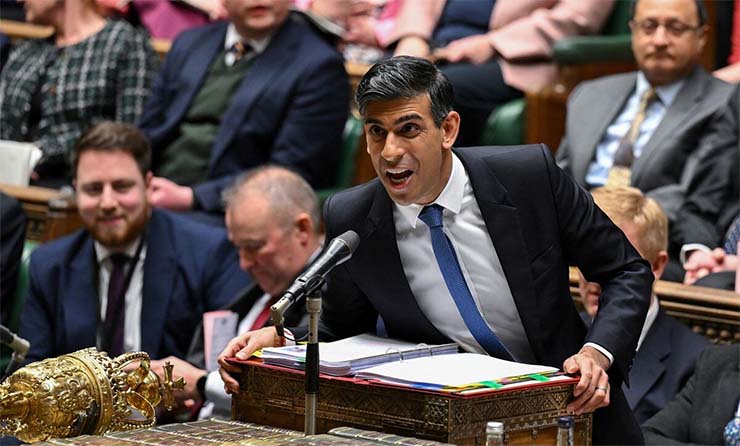
It is official. The British Parliament has officially passed the Anti-Migrant Bill, the flagship piece of legislation of the Rishi Sunak-led Conservative Government. The legislation aimed at sending illegal migrants who arrive in Britain via the perilous routes in the English Channel to Rwanda in exchange for millions of pounds of much-needed financial assistance for the underdeveloped African country.
This has been a polarising legislation in recent British political memory. There has been vociferous opposition to this law by rights groups in the country. The opposition Labour Party has alleged that the Conservative government was undermining the image of Britain as an anti-immigrant country, determined to erase the contribution of liberal nationalism to British human rights discourse.
However, the legislation has thrown up bigger issues of sovereignty, human rights, and the maintenance of internal security among nation-states around the world.
Changing stands of politics in Europe
Ever since the Syrian refugees saw the influx of one million refugees from the Middle Eastern country among other countries in the turbulent region, immigration has become a hot potato of an issue in European domestic politics. Calls for cracking down on illegal immigration have changed the political dispensations in several European countries, most notably Poland, Germany, Hungary, the Netherlands, and Italy.
The virulent anti-immigration sentiment has strengthened far-right parties in many European countries, notably Italy and the Netherlands. The sentiment against immigration from the countries in North Africa and the Middle East has seen the likes of Giorgia Meloni and Geert Wilders come to power in Italy and the Netherlands.
Calls for cracking down on illegal immigration have changed the political dispensations in several European countries such as Poland, Germany, Hungary, the Netherlands, and Italy. The sentiment against immigration from North Africa and the Middle East has seen the likes of Giorgia Meloni and Geert Wilders come to power in Italy and the Netherlands
EU sceptics argue that their stance on Britain leaving the European Union and reclaiming its national sovereignty via a no-open border policy was right. However, this issue has brought deeper issues of sovereignty and human rights to the fore.
Sovereignty v/s Human Rights
Sovereignty is one of the fundamental pillars of a nation-state, it was the outcome of the rise of the absolutist monarchies in Europe in the 16th century and the attempt of political thinkers and philosophers in the West to locate the source of state power. Over time the location of sovereignty has changed; Over the past hundred years, it has come to rest itself on the shoulders of democracy.
Sovereignty, however, has several dimensions – economic, political, technological, etc. The commencement of globalisation in the 1990s changed the very structure of the nation-state with the effective erosion of sovereignty among nation-states. A myriad of non-state actors has come to fill the void generated by this erosion.
Having said that, liberal democracy has vested the state with the responsibility of formulating welfare-oriented policies for the electorate to improve their quality of life and improve the developmental dimensions of the economy. This concomitantly entails the need to prioritise human rights, especially its global dimension.
Sovereignty has several dimensions – economic, political, technological, etc. The commencement of globalisation in the 1990s changed the very structure of the nation-state with the effective erosion of sovereignty among nation-states. A myriad of non-state actors has come to fill the void generated by this erosion
The anti-migrant law in the UK has revived that debate again. Does the UK have an international moral and ethical accountability to uphold the human rights of refugees who staked everything to make it to a new paradise? Or maintenance of national security and sanctity of the borders the paramount duty of the UK government?
There may not be any definite answer to this question, but one very clear thing is that the world we live in has become very turbulent in the recent past thanks to a raft of wars – Russia-Ukraine in Europe, Israel-Hamas in the Middle East and the relatively unknown yet immensely concerning civil war in Sudan that has triggered a catastrophic economic and social crisis in the war-torn country.
Where does India figure?
Being a country that prided itself in providing safe haven to tens of thousands of refugees over the centuries who fled their homeland due to religious persecution, social unrest, or other reasons, India’s say on this important issue is necessary.
The human rights-sovereignty issue, if left unaddressed, will have unforeseen consequences for India’s future, especially demographic composition and the global image as an upholder of human rights. Thus, there needs to be a lively debate and, if needed, drafting a suitable white paper on this important issue
From the point of view of international and domestic law, India is not a signatory to the UN Convention of Non-Refoulment of Refugees, 1951, and has no concrete refugee law regime. However, New Delhi needs to urgently think in that direction given the approval and official notification of the CAA or Citizenship Amendment Act recently. To complicate matters, many of the people fleeing the unrest in Myanmar following the 2021 coup by the Myanmar military have sought shelter in Bharat’s North-Eastern states leading to a showdown between the Central and State governments over the issue of deporting them or protecting their lives.
Hence, there needs to be a lively debate on this important issue and if needed drafting a suitable white paper on this matter. The human rights-sovereignty issue if left unaddressed, will have unforeseen consequences for Bharat’s future, especially demographic composition and her global image as an upholder of human rights.
–The writer is currently working as a Research Associate at Defence Research and Studies (dras.in) and is a columnist. The views expressed are personal and do not necessarily reflect the views of Raksha Anirveda















